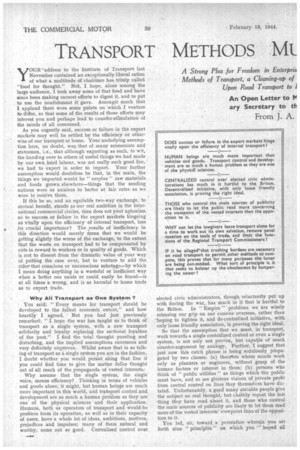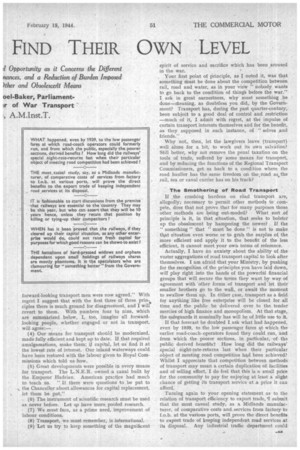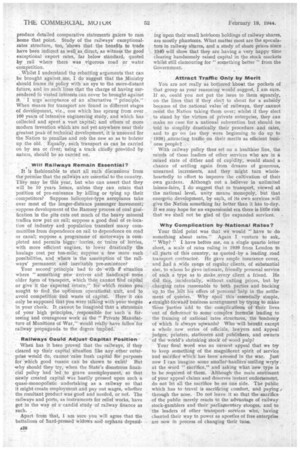TRANSPORT METHODS Mt
Page 26

Page 27

Page 28

If you've noticed an error in this article please click here to report it so we can fix it.
FIND THEIR OWN LEVEL
From J. A. A.M.Inst.T.
yOUR—address to the Institute of Transport last November contained an exceptionally liberal ration of what a multitude Of chairmen has tritely called "food for thought." Not, I hope, alone among the large audience, I took away some of that food and have since been making earnest efforts to digest it, and to put to use. the nourishment it gave. Amongst much that I applaud there were some points on 'which I venture to differ, so that some of the results of those efforts may interest you and perhaps lead to counter-stimulation of the minds of all concerned.
As you cogently said, success or failure in the export markets may well be settled by the efficiency or otherwise of our transport at home. Your underlying assumption here, no doubt, was that of many economists and statesmen, i.e., that although exporting as such, to wit, the handing over to others of useful things we had made by our own hard labour, was not really such good fun, we had to expOrt in order to import. Your further assumption, would doubtless be that, in the main, the things we imported would be " surplus " raw materials and foods grown elsewhere—things that the sending nations were as anxious to barter at fair rates as we were to receive them.
If this be so, and an equitable two-way exchange, to mutual benefit, stands as our real ambition in the international commercial circles, then does not your aphorism as to success or failure in the export markets hingeing so vitally upon the efficiency of internal transport, lose * its crucial importance? The ,results of inefficiency in this direction would merely Mean that we would be getting slightly the worse of the exchange, to the extent that the waste on transport had to be compensated by cuts in reward to workers or in quality of goods. Which is not to dissent from the dramatic value of your way of putting the case over, but to venture to add the rider that conscious or unconscious sabotage—by which I mean doing anything in a wasteful or inefficient way when a better one exists or could easily be found—is at all times a wrong, and is as harmful to home trade as to export trade.
Why All Transport as One System ?
You said: "Every means for transport should be developed to the fullest economic extent," and how heartily I agreed. But you had just previously remarked: I hope the war has taught us to think of transport as a single system, with a new transport solidarity and loyalty replacing the sectional loyalties of the past." I find the total thought puzzling and disturbing, and the implied assumptions enormous and very definitely unproven. Whilst aware that in so talking of transport as a single system you are in the fashion, I doubt whether you would persist alOng that line if you could find time to give the matter fuller thought out of all reach of the propaganda of vested interests: Why assume that the single system, the single voice, means efficiency? Thinking in terms of vehicles and goods alone, it might, but human beings are much more important in this world, arid transport control and development are as much a human problem as they are one of the physical sciences and their application. Humans, both as operators of transport and would-be profiters from its operation, as well as in their capacity of users, have a whole lot of ideas, ambitions, motives,. prejudices and impulses; many of them natural and worthy, some not so good. Centralized control over
elected civic administrators, though reluctantly put up with during the war,, has much in it that is hurtful to the Briton. In " Empire " problems we are wisely releasing our grip on our cousins overseas, rather than 'hoping to tighten it, and de-centralized initiative, with only loose friendly association, is proving the right ideal. So that the assumption that we must, in transport, work towards a single centralized control or even a single system, is not only not proven, but capable of much counter-argument by analogy. Further, I suggest that just now this catch phrase is being sedulously propagated by two classes: (a) theorists whose minds work only as planners or engineers, without grasp of the human factors or interest in them; (b) persons who think of " public utilities" as things which the public must have, and so see glorious visions of private profit from central control. on lines they themselves have dictated. Unfortunately, a good many amiable people give the subject no real thought, but chattily repeat the last -thing they have read about it, and those who control the main sources of publicity are likely to let them read more of the vested interests' viewpoint than of the opposition to it.
You led, sir, toward a peroration wherein you set forth nine " principles " on which you " hoped all forward-looking transport men were now agreed." With regret I suggest that with the first three of these prin-s
cipies there is much ground for disagreement, and I will revert to them. With numbers four to nine, which are summarized below, I, too, imagine all forwardlooking people, whether engaged or not in transport, will agree:—
(4) Our nieans for transport shoOld be modernized, made fully efficient and kept up to date. If that required amalgamations, make them; 4 capital, let us. find it at the lowest rate of interest. Our inland waterways could have been restored with the labour given to Royal Com
missions which told us how. .
(5) Great developments were possible in every means for transport. The L.N.E.R., owned s canal built by the Emperor Hadrian. American practice had much to teach us. " If there were questions to be put to the Chancellor about allowances for capital replacement, let them be put."
(6) The instrument of scientific research must be used as never before. Let qs have more pooled research, (7) We must face, as a prime need, improvement of labour conditions.
(8) Transport,we must remember, is international.
(9) Let us try to keep something ofthe magnificent
spirit of service and sacrifice which has been _aroused in the war.
Your first point of Principle, as I noted it, was that something must be done about the competition between rail, road and water, as in your'view "nobody wants to go back to the condition of things before the war." I ask in great -earnestness, why must something be done—Meaning, as doubtless you did, by the Government? Transport has, during the past quarter-century, been subjeet to a good deal of control and restriction —much of it, I admit with regret, at the impulse of certain transport interests themselves and for the benefit, as they supposed in .each instance, of "selves And friends."
Why note then, let the lawgivers leave (transport) well alone for a bit; to work out its own salvation? Still better, why not remove the penal taxation on the tools of trade, suffered by some means for transport, and by reducing the functions of the Regional Transport Commissioners, get us back to a condition where the road haulier has the same freedom on the ,road as. the rail, sea or canal carrier has on his track?
The Smothering of Road Transport
If the crushing burdens on thad transport are, allegedly; necessary to permit other methods fo .cornpete, does that not prove that for many purposes those, other methods are being out-moded? What sort .of principle is it, in that situation, that seeks to bolster up the obsolescent by hampering the newer? If the " something " that " mest be done " is not to melee that situation even worse or to grab the surplus of the more efficient and apply it to the benefit of the less efficient, it cannot meet your own terms of reference.
Actually, I have no anxiety about the ability of the vaster aggregations of road transport capital to look after themselves. I am afraid that your Ministry, by pushing for the recognition of the principles you have laid down, will play right into the hands of the powerful financial groups that will secure the terms they want by way of "agreement with 'other forms of transport and let their smaller brothers go to the wall, or await the moment to swallow them up. In either case, transport as a field for anything like free enterprise will be closed for all time and the public be delivered over to the tender mercies of high finance and monopolism. At that stage, the safeguards it nominally has will be of little use to it.
If that forecast be doubted I ask what had happened, even: by 1939, to the hew passenger fares at which the earlier road-coach. operators found they could run, and from which the poorer sections, in particular, of the public derived .benefits? How long did the railways' special night-rate-returns last when their particular object of meeting road competition ha,d been achieved? Whilst I appreciate that competition between methods of tra.nsport may mean a certain duplication of facilities and of selling effort, I do feel that this is a small price for the community to pay for enjoying at least a slight chance of getting its transport service at a price it can afford.
Turning again to your opening statement as to the relation of transport efficiency to export trade, submit that the most casual study, as a Midlands manufacturer, of comparative costs and_services from factory to f.o.b. at the various ports, will prove the direct benefits to export trade of keeping independent road services at its disposal. Any industrial traffic department could
produce detailed comparative statements galore to ram home that point. Study of the railways' exceptionalrates structure, too, 'shows that the benefits to trade have been indirect as welk.as direct, as witness the good exceptional export rates, far below standard, quoted by rail where there was vigorous road or water competition.
Whilst I understand the rebutting arguments that can be brought against me; I do suggest that the Ministry should frame its policy with an eye to the more-distant future, and on such lines that the charge of having cur rendered to vested interests Can never be brought against it. I urge acceptance of an alternative " principle," When means for transport are found in different stages of development, viz„ one which has sprung from over 100 years of intensive engineering study; and which has collected and spent a vast capital; and others of more modern invention which are not yet anywhere near their greatest peak of technical development, it is unsound for the Nation to penalize and rob the new so as to bolster up the old. Equally, such transport a's can be carried on by sea or river,. using a track chiefly provided by nature, should be so carried on.
WIII Railways Remain Essential?
It is fashionable to start all such discussions from the premise that the railways are essentialto the country. They may be this year, but who can assert that they will be 10 years hence, unless they can retain that position of pre-eminence by killing or -tying up their competitors? Suppose helicopter-type aeroplanes take over most of the longer-distance passenger Movement; suppose development of the Ramsey process of coal gasification in the pits cuts out much of the heavy mineral traffics now put on rail; suppose a good deal of re-location of industry and population transferd many communities from dependence on rail to dependence on road or canal; suppose a programme of motorways is completed and permits bigger -lorries; or trains of lorries,
• with more efficient engines, • to lower drastically the haulage cost per ton-mile; suppose a few more such possibilities, and where is the assumption of the rail ways' permanent and inevitable pre-eminence? •
Your second principle had to do. with situation where " something new arrives and handicapt: some older form of transport, which then Cannot find capital or give it the expected. :return," for which reason you sought to find.the optimum operational, unit, and to avoid competition and waste of capital. • Here it can only be supposed that you were talking with ybiir tangtie in your 'cheek. It .cannot be imagined that a stateSinan of your • high principles, responsible for such n farseeing and courageous work as the "Private Manufacture of Munitions of War," would really -have fallen 'for railway propaganda to the degree implied.
Railmiais-CoUld Adjust Capital Position • When has it been proved that the railways, if they cleared up their Capital Situation like any other enter-prise would do, cannot raise fresh. capital for purposes for -which good reason can be shown to exist? But -why should they try, when the State's disastrous finandal policy had led to grave unemployment, so that newly created capital was hastily pressed upon such a quasi-monopolistic undertaking as a railway so that it might create employment and pay out wages, whether the resultant "product was good and needed, or not. The railways and ports, as instruments for relief 'works, have got in the way of a candid study of railway finance as such.
Apart from that, I am sure you will agree that the battalions of hard-Pressed Widows and orphans depend1.26 jog upon their small heirloom holdings of railway shares, are mostly phantoms. What matter most are the speculators in railway shares, and a study of share prices since 1.940 will show that they are having a very happy time Clearing handsomely raised capital in the stock markets whilst still clamouring for "something better " from the Government.
.Attract Traffic Only by Merit
You are not really as bothered 'about the pockets of that group as your reasoning wouldsuggest, I am sure. If so, could you not put the issue to them squarely, on the lines that if they elect to shout for a subsidy because of the national value-of railways, they. cannot
. resist the Nation taking them over; whilst if they elect ' to stand. by the virtues of private enterprise, they can make no case for a national subvention but should be told to simplify, drastically their procedure and rates, and to go on (as they were beginning to do up to 1939) attracting traffic on their merits as efficient business people? .
With railway policy thusset on a healthier line, the minds of those leaders of other services who are in a mixed state of dither and of cupidity, would stand a chance of settling again from dreams of generous, unearned increments, and they might turn wholeheartedly to effort to improve the cultivation of their own gardens. Although not a believer in unlimited laissez-faire, I do suggest that in transport, viewed at the national level, unity means monopoly, but that energetic development, by each, of its own services will give the Nation something far better than it has to-day. If we may hope for an expansionist era there is little risk that we shall not be glad of the expanded services.
Why Complication by-National Rates?
Your third point was that we would "have to do something about rates,'.' Again I venture to ask, " Why? " I have before me, on a single quarto letter sheet, a scale of rates ruling in 1939 from London to all .parts of this country, as quoted-by a leading road transport contractor. He gave ample insurance cover,
• and had a wide range of regular clients, of substantial size, to whom he gave intimate, friendly personal service of such a type as to make every client a friend. He
• did this, incidentally, without cutting prices, but by .charging rates reasonable to both parties and backing up to the hilt his offers of personal help in the settlement of queries. Why spoil— this esSentially simple,
• straight-forward business arrangement by tying to Make these parties add to the coMplications of their lives out of deference to some complex forrimi leading to the framing of national rates structures, the 'tendency
of which fs always upwards? Who benefit except a whole new series of officials, lawyers and appeal judges; printers, stationer§ andpublishers, and owners -of the wdrld's shrinking -stock ofwood pulp?
• Your final word was an earneSt appeal that we try to keep something of the magnificent spirit of service and sacrifice' whicY his been arou§ecT in the war. Just now I can imagine some striaIlef-haullerssmiling wryly. at the weird "sacrifice," and asking what -new type is to be required'of them. 'Although the main sentiment of your appeal claim's and deserves instant endOrSement, do not let all the sacrifice be on one side. The public which has to travel is sacrificing comfort, and paying • through the nose. Do not leave it so that the -sacrifice of the public merely reacts to the advantage of railway stock-gamblers and their parliamentary stooges, and to . the leaders of other transport. services whin having chanted their way to power as apostles of free enterprise are now in process of changing their tune.




















































